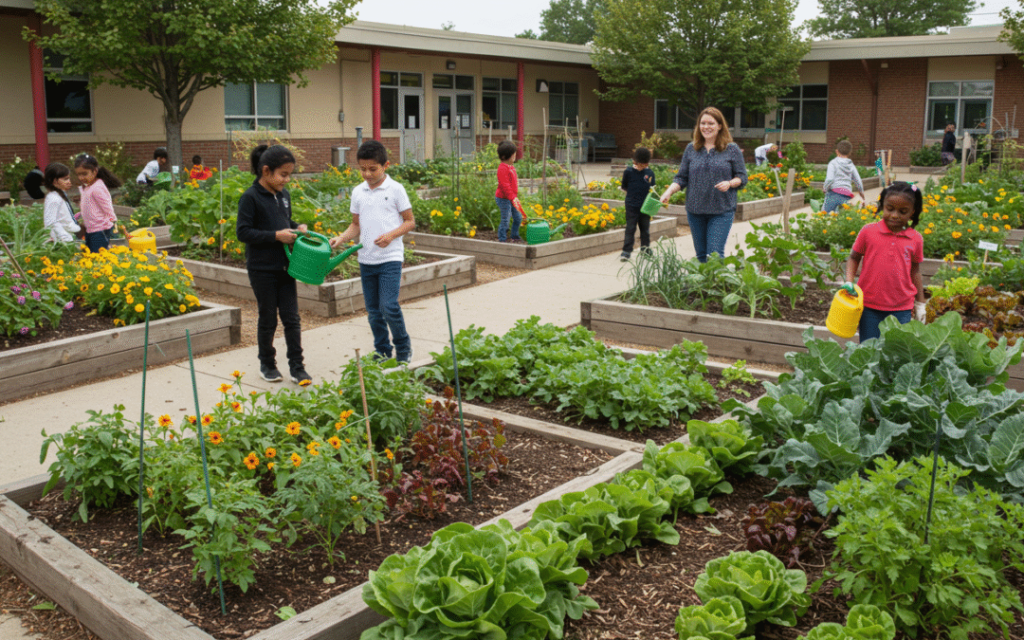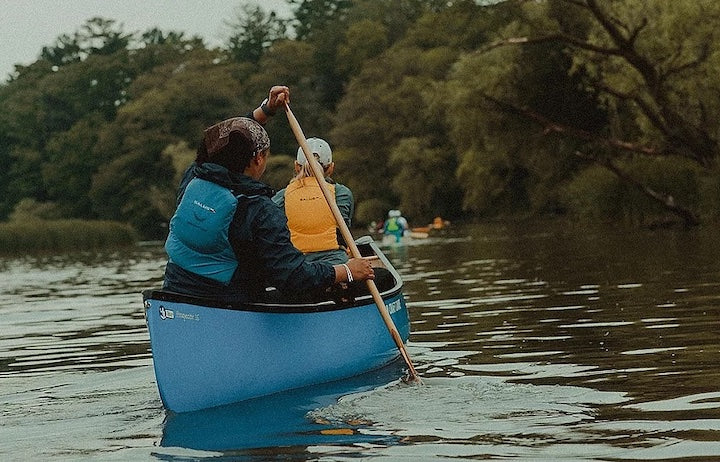Keeping you up to date with all things adventure education & outdoor learning...
We’ve hand-picked 3 recent studies from the Journal of Adventure Education and Outdoor Learning so you don’t have to do the heavy reading.
So, the next time you want to pull out some hard facts and stats on just how epic outdoor education is – we’ve got you covered

Article 1: "Effects of a school garden experiential intervention project on primary pupils’ environmental behaviour" - Emmanouel Arizanis
Overview
This article investigates how a school garden-based experiential intervention influences pupils’ intrinsic motivation, nature connectedness, and related attitudes. The garden intervention is designed to provide hands-on opportunities in a green, living environment as part of the school setting. Taylor & Francis Online
Key Points
- The garden intervention positively influenced pupils’ intrinsic motivation toward school activities.
It also strengthened their connectedness to nature – students reported feeling more close or emotionally tied to plants, soil, and ecosystems.
Some of the strongest effects appeared when students had repeated or sustained engagement (not just one-off sessions).
- The study suggests that school-based environmental interventions can be feasible and impactful in formal education contexts
Takeaways
Incorporating green spaces and garden work into school curricula has more than aesthetic benefit – it can foster deeper motivation and nature-related attitudes.
To maximize impact, these interventions should be sustained over time rather than a one-off “garden day.”
Reflection and integration with curricular content (e.g. linking plant growth to science curriculum) may help cement gains.
Our Thoughts
We love this because it shifts part of the “adventure / outdoors” work into the school grounds – integrating nature into daily school life for students and helping to foster a love of nature. In terms of our programs, this suggests that daily, hands-on connection with nature could be useful to students on trips with us. Ideally, we could link into projects that the school might be doing.

Article 2: "Long-term impacts of a canoe expedition on women’s lives: a 20-year longitudinal study" - Anja Whittington
Overview
This is a 20-year case study of women who, during adolescence, participated in a 3-week backcountry canoe expedition. The study explores how that experience shaped their life trajectories, identities, and values over the decades. Taylor & Francis Online+1
Key Points
Many participants reported lasting changes in self-concept, resilience, and life priorities traced back to the canoe expedition.
The experience was often cited as a “narrative landmark” – a defining moment participants referenced in how they understood their lives.
Social bonds and peer relationships formed during the trip remained psychologically meaningful.
The wilderness canoe expedition gave women experiences of agency, challenge, and autonomy that contrasted with more constrained life stages (e.g. schooling, early adulthood).
Takeaways
Intense outdoor expeditions can act as long-term identity anchors, not just short-term interventions.
Program designers should think about how expedition narratives can be woven into participants’ life stories (journals, storytelling, social networks).
Social embedding matters: the friendships and peer support from the trip seem to help “carry forward” the impact.
Our Thoughts
The idea that a 3-week expedition has such a lasting impact on this group of women is brilliant to hear. We’d love for our trips to have an impact, even on a smaller scale. The takeaway that the expedition gave them “experiences of agency, challenge, and autonomy” really resonates with us and this is what we hope to achieve through our trips for students – continuing to encourage students to step out of their comfort zone to create memorable and impactful experiences, shared with peers. It’s this sort of research that has inspired us to launch our Adventure Expeditions Weeks

Article 3: "The wild turn in sustainability education – a critical relational perspective on the role of education in caring for people and planet" Reineke Susan van Tol
Overview
This article is a narrative literature review that explores wild pedagogies (WP) as a learning approach for sustainability.
It explores how for a healthy and sustainable future for people and planet, change is needed. Education can be a key lever towards such change. In this article, wild pedagogies (WP) are explored as one ecology of learning for transition towards a caring relationship with the world.
Taylor & Francis Online+2Wageningen University & Research+2
Key Points
-
Wild pedagogies (WP) emphasise embodied, emergent, relational learning in which humans and non-humans co-create meaning. ResearchGate+1
-
The “wild turn” invites learners to reflect on who they are in relation to the world, not just what they know about environmental problems. ResearchGate+1
-
This perspective critiques traditional environmental education for being too anthropocentric (human-focused) and calls for more relational, post human lenses. Wageningen University & Research+1
-
The review situates Wild Pedagogy alongside other critical educational frameworks (e.g. critical pedagogy, place-based education) and explores tensions and synergies. Taylor & Francis Online+1
Takeaways
-
To support sustainability, educators should design learning that dissolves rigid human–nature boundaries and fosters relational awareness.
-
Outdoor/adventure learning programmes might adopt practices that prompt learners to sense more-than-human agency (e.g. listening to wind, observing micro-ecosystems).
-
Reflection is critical – helping learners articulate how they become-with non-human others.
Our Thoughts
This article is urging us to think of the way in which we educate. It suggests that instead of “we teach about nature,” we think “we learn with nature.” It also offers us a chance to reflect upon who we are as part of our earth’s ecosystem, how we relate to the natural world and learn from that. As we design adventures, we might experiment with silent walks, multi-sensory activities, or creative writing prompts that orient attention outward, not just inward. The challenge is grounding this in practice so it doesn’t feel too abstract to students.

